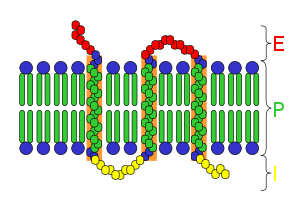
Back Reseptor (biochemie) Afrikaans مستقبل (كيمياء حيوية) Arabic Receptor (biohemija) BS Receptor (bioquímica) Catalan Receptor Czech Receptor Danish Rezeptor (Biochemie) German Receptor (biochemistry) English Ricevanto (biologio) Esperanto Receptor celular Spanish

P = plasma membrane
I = inside the cell
In cell biology, a receptor is a special structure that can be found in cell membranes. These are made of protein molecules such as glycoproteins. Receptors bind (attach) to specialised molecules. If the receptor has this molecule, it is activated, but if it does not it is deactivated. Depending on its state, a change inside the cell happens.
Cell surface receptors (membrane receptors, transmembrane receptors) take part in communication between the cell and the outside world. Extracellular signalling molecules (usually hormones, neurotransmitters, agonist, cytokines, growth factors or cell recognition molecules) attach to the receptor. This triggers changes in the function of the cell. The process is called signal transduction: The binding starts a chemical change on the inside of the membrane.
Receptors work like locks and keys. With the key, the lock can be locked or unlocked. If it is unlocked, the door belonging to it can be opened.